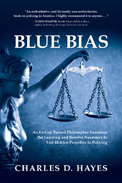
 |
Blue Bias: An Ex-Cop Turned Philosopher Examines the Learning and Resolve Necessary to End Hidden Prejudice in Policing
by Charles D. Hayes
Autodidactic Press
In this extraordinarily detailed book, Hayes takes a step back from the seemingly day-to-day headlines regarding excessive police force to examine in a holistic and interdisciplinary approach some of the reasons policing in our American society has become so problematic. A police officer in Dallas back in the 1960s, Hayes has in the decades since dedicated his life to understanding the human psychology behind excessive police force, brutality, and the relationship between police officers and the communities they are sworn to protect and serve. Much of the book examines the academic and scientific evidence provided by such intellectual disciplines as anthropology, evolutionary biology, brain chemistry and processes, politics, sociology, economics (especially inequities therein), and how our basic biological predilections as human beings can often jar against the enormously taxing and sophisticated jobs we expect our men and women in uniform to exercise with levelheaded precision once we place a gun in their holster and put them on the beat.
Hayes discusses, at length, our unconscious, emotional selves located, in large part, in the human body's limbic system. He further explores how one's "silent partner" is a hyper-alert subset of that system which operates milliseconds ahead of our conscious selves. Forced to make snap judgments, it is "always interpreting and hastening connections in your brain" with a vigilance so incredibly determined to keep us free from any perceived harm that, unfortunately, it is prone to making errors in judgment at times. In a police officer's line of work, such judgment errors can often be fatal. Hayes intentionally uses both "police officers" and "peace officers" interchangeably as a refreshing reminder that although there are many roles an officer of the law will play, in the end, he or she is placed in the delicate position of one whose primary task is, in fact, to keep the peace.
Part philosophy, part scientific analysis, part inspirational tome for young men and women considering a career in law enforcement and the police chiefs and leadership responsible for personnel and administration of such professionals, Hayes' book is without a doubt greater than the sum of its parts. In addition to being presented as an "open university" for those considering and already in the policing line of work, the author invites the general public as well to take part in his "course"—one open to any citizen interested in the vast and significant issues surrounding policing best practices in an often racist and unjust America.
The author examines such high-profile cases as those involving Sandra Bland, Eric Garner, and other tragic events of police injustice committed on the part of those wearing the badge in recent years. He examines how such cases of police brutality and excessive force—even against unarmed and non-resisting citizens—can instantaneously go viral and become available for the entire world to witness. The author discusses issues surrounding the usage of body cameras (which he favors) and notes that tens of thousands of hits on YouTube of a rogue officer doing wrong can quickly undermine years and years of deliberate sensitivity training and field practice in the correct use of force.
Complex issues of implicit and explicit bias, tribalism, and the like—all built into the human condition but not necessarily helpful when it comes to the already incredibly complex jobs of policing—are examined at length in this tome by a man who has spent the better part of a half-century studying such issues. "When we arm men and women with a badge and gun and send them into conflicting situations," Hayes writes, "we change their brain chemistry. We set you up to drive whatever biases you have already assimilated deeper. And unless you can become hyperaware about how bias works, you will be subject to continuously making the same mistakes in judgment."
Hayes notes, powerfully, that the primary goal is justice, and if an officer wants to internalize a genuinely blue bias to serve and protect, then he or she must "lean into learning." With a sophisticated understanding of "how our brains function with beliefs, biases, and our biological predilections under stress," he writes, one can become sufficiently equipped to protect oneself and those whom one serves.
RECOMMENDED by the US Review